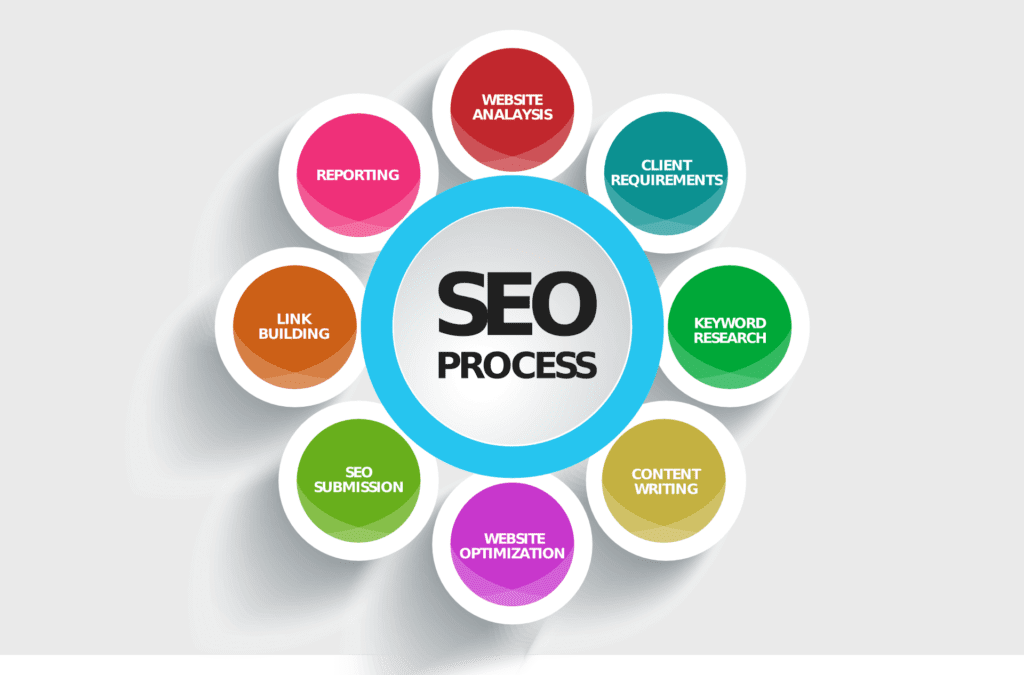SEO pricing in the UK presents a complex landscape, where costs can range from £50 per hour for freelancers to over £5,000 per month for premium agencies. Understanding these variables is essential for businesses looking to invest wisely in their digital presence.
The cost structure depends heavily on your chosen provider and the scope of the project. Agencies typically charge £500-£5,000+ per month for comprehensive services, while freelancers and consultants often offer more budget-friendly alternatives at £50-£250 per hour. Many providers also offer fixed packages or performance-based pricing models to suit different business needs.
Your investment should align with your expectations and budget constraints. Most businesses allocate between £100 and £10,000 per month for SEO, but the key lies in evaluating the potential return on investment rather than focusing solely on upfront costs. The right SEO strategy can deliver substantial long-term value that far exceeds the initial expenditure.
Key Takeaways
- SEO costs per hour in the UK range from £50 for entry-level to over £250 for high-level expertise.
- Monthly SEO prices vary from £500 to over £5,000, depending on project complexity and industry competition.
- Per project, SEO costs are customised, influenced by project scope and client expectations, and aligned with industry benchmarks.
- Product and performance-based SEO pricing offers package deals, tailored strategies, and costs directly linked to results.
- Basic, but good, SEO services for small businesses cost around £500 to £2,000, while advanced services range between £1000 and £5000 for mid- to large-scale e-commerce sites and corporate websites. Large-scale projects and comprehensive services, including link building, cost over £10,000.
Boost Your Online Visibility With Kaleto.Digital

SEO costs UK: The different types of SEO providers

Let’s now focus on the different SEO providers dominating the UK market.
We’re looking at:
- SEO agencies
- Independent consultants and freelancers
- In-house teams or specialists
Each has unique advantages, challenges, and SEO pricing models, which we’ll discuss next.
SEO Agencies
The UK’s SEO market is structured around three primary service providers, each offering distinct advantages and pricing approaches. SEO agencies represent the most popular choice for established businesses seeking comprehensive digital marketing solutions.
Why UK Businesses Choose SEO Agencies
SEO agencies provide several compelling advantages for British companies. They maintain dedicated teams of specialists covering everything from technical SEO to content creation and link building. This breadth of expertise means you’ll have access to keyword researchers, content writers, technical analysts, and outreach specialists all working cohesively on your project.
Their comprehensive service offerings typically include technical audits, competitor analysis, content strategy, local SEO optimisation, and ongoing performance monitoring. For businesses operating across multiple locations or targeting national markets, agencies can manage large-scale campaigns that would overwhelm individual freelancers.
Potential Drawbacks to Consider
However, agency partnerships aren’t without their challenges. The premium for their expertise and infrastructure often translates to higher monthly retainers, typically starting from £1,500 to £2,000 for small to medium-sized enterprises and escalating significantly for complex projects.
The shared attention model means your account may be one of dozens managed by the same team. This can result in slower response times, less flexibility for urgent requests, and potentially generic strategies that aren’t fully tailored to your specific market position.
Additionally, many UK agencies operate with longer contract terms, often requiring 6-12 month commitments that can limit your ability to pivot quickly if results don’t meet expectations.
Selecting the Right SEO Agency
The UK’s SEO market is structured around three primary service providers, each offering distinct advantages and pricing approaches. SEO agencies represent the most popular choice for established businesses seeking comprehensive digital marketing solutions. For example, Kaleto.Digital is an SEO agency in Liverpool focusing on the local market, along with the rest of the UK.
Why UK Businesses Choose SEO Agencies
SEO agencies provide several compelling advantages for British companies. They maintain dedicated teams of specialists covering everything from technical SEO to content creation and link building. This breadth of expertise means you’ll have access to keyword researchers, content writers, technical analysts, and outreach specialists, all working cohesively on your project.
Their comprehensive service offerings typically include technical audits, competitor analysis, content strategy, local SEO optimisation, and ongoing performance monitoring. For businesses operating across multiple locations or targeting national markets, agencies can manage large-scale campaigns that would overwhelm individual freelancers.
Potential Drawbacks to Consider
However, agency partnerships aren’t without their challenges. The premium for their expertise and infrastructure often translates to higher monthly retainers, typically starting from £1,500 to £2,000 for small to medium-sized enterprises and escalating significantly for complex projects.
The shared attention model means your account may be one of dozens managed by the same team. This can result in slower response times, less flexibility for urgent requests, and potentially generic strategies that aren’t fully tailored to your specific market position.
Additionally, many UK agencies operate with longer contract terms, often requiring 6-12 month commitments that can limit your ability to pivot quickly if results don’t meet expectations.
Selecting the Right SEO Agency
When evaluating potential partners, prioritise agencies with demonstrable experience in your sector. Request case studies showing measurable results for businesses similar to yours, particularly focusing on UK market successes rather than generic international examples.
Examine their transparency around reporting and communication protocols. The best agencies provide detailed monthly reports, regular strategy calls, and clear explanations of their methodologies. Be wary of agencies that can’t clearly articulate their approach or promise unrealistic timelines for results.
Consider their approach to local SEO if you serve UK customers, as understanding British search behaviours, local citation requirements, and regional competition is crucial for success.
The ideal agency partnership should align seamlessly with your business objectives, available budget, and expected timeline for SEO improvements. Look for providers who view themselves as strategic partners rather than simply service vendors.
SEO Consultants And Freelancers

Beyond agencies, SEO consultants and freelancers represent the UK’s most flexible and cost-effective service tier. These independent professionals offer distinct advantages for businesses seeking specialised expertise or working within tighter budgets.
SEO Freelancers: Affordable Expertise with Personal Service
Freelancers typically provide the most budget-friendly entry point into professional SEO services. Working directly with individual specialists eliminates agency overhead, resulting in significantly lower costs while maintaining high-quality output.
The personal relationship aspect cannot be understated – freelancers often provide direct access to the person actually executing your SEO strategy. This means faster communication, immediate feedback, and strategies tailored specifically to your business rather than templated approaches.
However, capacity limitations present the primary challenge. Most freelancers can effectively manage only 5-10 active clients, which may impact their availability for urgent requests or large-scale projects. Additionally, their skill sets might be concentrated in specific areas rather than covering the full SEO spectrum.
SEO Consultants: Strategic Expertise and Industry Authority
SEO consultants generally bring more extensive experience and strategic thinking to the table. Many are former agency directors or specialists who’ve established independent practices after building substantial industry reputations.
Consultants excel at developing high-level strategies, solving technical problems, and providing objective assessments of existing SEO efforts. They’re particularly valuable for businesses requiring specific expertise – such as international SEO, technical migrations, or penalty recovery – that might exceed typical agency capabilities.
The trade-off comes in the form of higher hourly rates and potentially less hands-on execution. Many consultants focus on strategy and oversight rather than day-to-day implementation tasks.
UK Pricing Structure for Independent SEO Professionals
Junior Freelancers (£25-£50/hour)
Recently established freelancers or those transitioning from other marketing roles. Suitable for basic SEO tasks, content optimisation, and small local businesses. Monthly retainers typically range from £500-£1,200.
Experienced Freelancers (£50-£100/hour)
Specialists with 3-7 years of focused SEO experience. They can handle comprehensive campaigns for SMEs, including technical audits, content strategies, and link building. Monthly commitments usually fall between £1,200 and £3,000.
Senior Freelancers (£100-£150/hour)
Highly experienced professionals with proven track records and niche specialisations. Often work with larger businesses or complex projects requiring advanced technical knowledge. Monthly retainers range from £2,500 to £5,000.
SEO Consultants (£150-£400+/hour)
Industry experts offering strategic guidance, audits, and specialised problem-solving. Many work on a project basis rather than ongoing retainers, with comprehensive audits costing £2,000 to £10,000+, depending on business size and complexity.
Key Advantages of Independent Professionals
Direct communication eliminates the telephone game effect common with agencies. You’ll work directly with the person implementing your strategy, ensuring nothing gets lost in translation between account managers and execution teams.
Flexibility represents another significant benefit. Independent professionals can adapt quickly to changing priorities, pivot strategies based on results, and accommodate specific business requirements without navigating agency bureaucracy.
Specialisation also proves valuable – many freelancers and consultants focus on specific industries or SEO aspects, potentially offering deeper expertise than generalist agency teams.
Potential Limitations to Consider
Accountability structures may be less formal than agency relationships. While this can lead to more flexibility, it may also result in less structured reporting or project management processes.
Continuity concerns arise if your chosen professional becomes unavailable due to illness, increased workload, or career changes. Unlike agencies with backup resources, independent professionals may struggle to maintain service levels during busy periods.
Scope limitations mean some freelancers excel in specific areas but may lack comprehensive capabilities across all SEO disciplines. You might need multiple specialists rather than a single provider.
Making the Right Choice
Independent SEO professionals work best for businesses seeking cost-effective solutions, direct relationships, or specialised expertise. They’re particularly suitable for companies with internal marketing teams who need strategic guidance rather than full-service implementation.
Consider your risk tolerance, budget constraints, and preference for relationship style when choosing between freelancers and consultants. Both can deliver exceptional results when properly matched to your business requirements and expectations.
In-house teams and specialists

The third pillar of the UK’s SEO landscape centres on internal capabilities – whether through dedicated in-house teams, hybrid approaches, or DIY implementations. This option represents the most integrated approach to SEO management, offering complete control over strategy and execution.
In-House SEO Teams: Complete Control and Integration
Building an internal SEO team provides unparalleled alignment with business objectives and company culture. In-house specialists develop intimate knowledge of your products, customers, and market positioning that external providers often struggle to match.
In-house teams excel at rapid response times and seamless integration with other departments. When product launches require immediate SEO support or marketing campaigns need technical optimisation, internal teams can pivot instantly without external consultation delays.
The collaborative advantage proves particularly valuable for e-commerce businesses or companies with frequently changing product lines. In-house SEO professionals work directly with developers, content creators, and product managers, ensuring SEO considerations are embedded in every business decision from the outset.
However, building effective in-house capabilities requires significant investment in both recruitment and ongoing education. SEO evolves rapidly, requiring continuous training and investment in tools that many businesses often underestimate.
Outsourced SEO: Specialised Expertise Without Overhead
External SEO providers offer immediate access to advanced expertise and established processes without the overhead of full-time employees. Outsourced teams bring experience from multiple industries and clients, often providing broader perspective on what works across different market conditions.
Cost predictability represents another advantage – monthly retainers or project fees are often more manageable than the combined costs of salaries, benefits, training, and tools required for in-house teams.
Outsourced providers also maintain cutting-edge tools and technologies that would be prohibitively expensive for individual businesses. Access to enterprise-level SEO platforms, advanced analytics tools, and proprietary research often justifies the external investment.
The primary drawback involves potential misalignment with company priorities and slower response times for urgent requests. External providers manage multiple clients, which can impact availability during critical periods.
UK Cost Analysis: In-House vs Outsourced SEO
In-House SEO Costs
Junior SEO Executive: £22,000-£35,000 annually plus benefits (approximately £28,000-£45,000 total cost)
- Limited experience, but good for basic optimisation tasks
- Requires significant training and mentorship
- Best suited for small businesses with straightforward SEO needs
Mid-Level SEO Specialist: £35,000-£55,000 annually plus benefits (approximately £45,000-£70,000 total cost)
- 3-5 years of experience with a proven track record
- Can manage comprehensive SEO strategies independently
- Suitable for medium-sized businesses with an established web presence
Senior SEO Manager: £45,000-£85,000+ annually plus benefits (approximately £70,000-£110,000+ total cost)
- Extensive experience with strategic planning capabilities
- Can lead teams and integrate SEO across multiple departments
- Required for large businesses or competitive industries
Additional costs include SEO tools (£500-£2,000+ monthly), training and conferences (£2,000-£5,000 annually), and potential recruitment fees (15-25% of annual salary).
Outsourced SEO Investment Comparison
The equivalent expertise through outsourced services typically costs:
- Junior level work: £800-£2,000 monthly (£9,600-£24,000 annually)
- Mid-level expertise: £2,000-£4,000 monthly (£24,000-£48,000 annually)
- Senior strategic support: £4,000-£8,000+ monthly (£48,000-£96,000+ annually)
Specialist vs Generalist SEO Approaches
SEO Specialists: Deep Expertise in Focused Areas
Specialist SEO professionals concentrate on specific disciplines such as technical SEO, content optimisation, or link building. They provide cutting-edge knowledge in their chosen field and often deliver superior results for complex challenges within their expertise area.
Technical SEO specialists excel at resolving crawling issues, implementing structured data, and optimising site architecture. Content SEO specialists understand advanced keyword research, user intent mapping, and content performance optimisation. Link building specialists maintain extensive networks and understand the nuances of earning high-quality backlinks.
The limitation lies in their narrow focus – specialist SEOs may lack comprehensive understanding of how their work integrates with broader marketing objectives or other SEO disciplines.
SEO Generalists: Comprehensive but Broader Knowledge
Generalist SEO professionals maintain working knowledge across all SEO disciplines while specialising in strategic coordination and campaign management. They excel at identifying how different SEO elements interact and prioritising efforts for maximum impact.
Generalists prove particularly valuable for smaller businesses requiring comprehensive SEO support within limited budgets. Their broad perspective helps identify opportunities across multiple areas and ensures balanced campaign development.
However, generalists may lack the deep expertise required for complex technical challenges or advanced link building in highly competitive industries.
DIY SEO vs Professional Services: A Realistic Assessment
DIY SEO Capabilities and Limitations
DIY SEO can be viable for small businesses with limited competition and straightforward optimisation needs. Basic tasks like keyword research, content optimisation, and local business listings are accessible to motivated business owners willing to invest in learning time.
Free and low-cost tools, such as Google Search Console, Google Analytics, and keyword research platforms, provide sufficient functionality for basic SEO implementation. Many online resources and courses offer structured learning paths for business owners.
However, DIY approaches often struggle with technical implementation, advanced competitive analysis, developing the correct strategy, and link building at scale. The time investment required for effective DIY SEO frequently exceeds what busy business owners can realistically maintain.
When Professional Services Justify the Investment
Professional SEO services become essential when businesses face significant competition, require technical expertise, or need scalable link-building strategies. The time savings alone often justify professional investment – experienced SEO professionals can accomplish in hours what might take DIY practitioners weeks to research and implement.
Professional services also provide accountability, structured reporting, and strategic guidance that DIY approaches typically lack. The cost of professional SEO often represents a fraction of potential revenue increases from improved search visibility.
Making the Strategic Choice
The optimal approach depends on factors such as business size, budget, competition level, and internal capabilities. Small local businesses might succeed with DIY efforts supplemented by occasional professional consultations. Medium-sized companies often benefit from hybrid approaches combining internal coordination with external specialist support.
Large enterprises typically require either comprehensive in-house teams or premium agency partnerships to compete effectively in their markets. The key lies in honestly assessing your current capabilities, available resources, and competitive requirements before committing to any particular approach.
Consider starting with smaller external investments to understand SEO’s impact on your business before making significant internal hiring decisions. This approach allows you to develop informed expectations and requirements for potential in-house team members.
SEO Pricing Structures In The UK
Let’s now turn our attention to the various SEO pricing structures in the UK. In the industry, there are generally five key models:
- Hourly rates
- Monthly retainers
- Project-based pricing
- Product-based pricing
- Performance-based pricing
We’ll give you the lowdown on what each entails and what you can expect from them.
SEO costs per hour
Peeling back the layers of SEO pricing in the UK, we find that one common structure is the hourly rate. This method provides a clear SEO cost comparison for businesses.
Here’s an SEO hourly rates analysis:
- Entry-Level SEO: These professionals charge between £50-£100 per hour. They’re suitable for smaller tasks or businesses on a tight budget.
- Mid-Level SEO: With more experience and a broader skillset, these experts charge between £100-£150 per hour. This is the most common rate and is suitable for most businesses.
- High-Level SEO: With a deep understanding of SEO, these top-tier experts charge upwards of £150 per hour.
These SEO pricing trends in the UK allow businesses to predict and manage their SEO costs effectively.
SEO costs per month
Shifting our focus to monthly SEO costs, many UK agencies offer structured SEO packages with prices that typically range from £500 to over £5000 per month. The project’s complexity, the competitiveness of your industry, and the goals you aim to achieve with your SEO strategy determine these costs.
When comparing SEO costs, it’s important to consider the value and potential ROI rather than just the price tag. SEO pricing trends indicate an increase in demand for thorough, results-driven packages.
As for SEO budgeting strategies, we recommend allocating a portion of your marketing budget to SEO, as it has proven to be a cost-effective way to increase online visibility, attract more customers, and ultimately grow your business.
SEO costs per project
Project-based SEO costs are usually customised to your specific needs and can vary greatly depending on the project scope.
- Project Scope: The size and complexity of your project directly influence the cost. Larger, more complex projects require more time and resources, increasing the price.
- Client Expectations: Your goals and desired outcomes can impact cost. You’ll likely pay more if you’re after top rankings in competitive markets.
- Industry Benchmarks: SEO costs are often aligned with industry standards. Monitoring these benchmarks will help you understand whether you’re getting value for your money.
Product-Based SEO Pricing
We’re focusing on product-based SEO pricing, a prevalent model among UK-based SEO providers. This pricing structure often involves SEO package deals, where specific services are bundled at a set price. These packages can include keyword research, content creation, link building, and more.
However, the ‘one-size-fits-all’ approach may not meet everyone’s needs. Hence, some providers offer customised or even truly bespoke SEO strategies. These are tailored to your business’s unique requirements and goals, usually at a higher price.
An SEO price comparison ensures you get value for your money. Understanding what’s included in each package or custom strategy, as well as the potential return on investment, is essential.
Performance-Based SEO Pricing
While product-based SEO pricing is common, another popular model in the UK is performance-based SEO pricing, where the cost is directly linked to the results achieved. This model often appeals to businesses due to its results-driven strategies, aligning the SEO agency’s success with your own.
- Results-Driven Strategies: With performance-based pricing, the agency only benefits when you do, encouraging aggressive and innovative strategies to boost your ranking.
- Performance Metrics: The cost is tied directly to specific performance metrics, providing transparent ROI analysis and a clear understanding of what you’re paying for.
- ROI Analysis: This model clearly shows your return on investment, making it easier to justify the cost of SEO services.
In essence, performance-based SEO pricing offers a mutually beneficial, results-oriented approach.
Budgeting For SEO – What To Expect
When discussing budgeting for SEO, it’s essential to understand the potential costs involved.
The spectrum is broad, ranging from average costs of £100 to £1000, up to £5000, and even exceeding £10,000.
In the following sections, we’ll guide you through what to expect at these price points.
£100 to £1,000 Average SEO costs
In SEO services, you’ll likely find average costs ranging from £0 to £1000, and it’s important to comprehend what you can anticipate within this budget. This range reflects the vast landscape of SEO cost comparisons and diverse pricing trends in SEO.
- Initial SEO Audit: You may encounter free or low-cost SEO audits at the lower end. These services typically identify basic website issues affecting your search engine ranking.
- Local SEO: Costing around £200 to £1000, local SEO services focus on improving your website’s visibility within a specific geographical area, ideal for small businesses.
- Basic SEO Packages cost around £500 to £1000 and usually include keyword research, on-page optimisation, and link building.
£1,000 to £5,000 Average SEO Costs
For businesses with a larger budget, SEO costs can range from £1,000 to £5,000, offering more extensive and aggressive strategies. Several SEO cost factors influence this, including website size, industry competition, and the scale of the SEO campaign.
Pricing trends suggest that this range typically encompasses advanced keyword research, content creation, link building, and technical SEO. These all-encompassing services can significantly improve your website’s visibility and organic traffic.
To make the most out of your budget, follow these SEO budgeting tips:
First, make sure your marketing budget can sustain the ongoing costs.
Secondly, be prepared for the long-term commitment required for substantial SEO results.
Lastly, always opt for quality over quantity when choosing an SEO provider.
Over £10,000
Splurging on SEO services that cost over £10000 isn’t uncommon, especially if you aim for an all-encompassing and aggressive digital marketing approach. You’re making a significant SEO investment, but what should you anticipate?
- Thorough SEO Services: With a larger SEO budget, you’d look at a full range of SEO services. This could include on-site optimisation, backlink building, content creation, technical SEO, and more.
- Dedicated Team: You’d likely have a specialised team working on your SEO, ensuring consistent and tailored strategies.
- Regular SEO cost analysis guarantees you’re getting value for your money.
Estimating SEO return on investment
Now, let’s move on to estimating SEO return on investment.
We’ll discuss critical factors such as:
- Keyword research
- Traffic potential
- Engagement rate
- Conversion rate
- Revenue
- ROI.
Understanding these aspects is important as they directly impact the value you get from your SEO spend.
We even created an SEO ROI calculator to give you a rough idea of what sort of traffic and conversions you can expect given your target keywords and their search volume.
Keyword Research And Traffic Potential
Before we explore SEO pricing, it’s important to grasp how keyword research and traffic potential can greatly impact your return on investment.
- Traffic Analysis: This involves analysing your website’s existing traffic. It helps us understand where your visitors are coming from and what keywords they use to find your site.
- Keyword Competition: We assess the competitiveness of your desired keywords. It might be harder to rank highly without significant investment if they’re highly competitive.
- Conversion Optimisation: After attracting traffic, converting visitors into customers is essential. We’ll optimise your website to increase the likelihood of conversions.
Understanding these components helps strategise an effective SEO plan, determine its cost, and estimate the potential ROI.
Engagement Rate
To fully understand the return on your SEO investment, we must explore your site’s engagement rate. This rate, defined by engagement metrics, gives us insight into user behaviour, showing how visitors interact with your site.
A high engagement rate typically indicates well-optimised content and a user-friendly site layout, which can improve conversion rates.
Let’s break down some key engagement metrics:
| Metric | Definition | Importance |
|---|---|---|
| Bounce Rate | Percentage of visitors who leave after viewing one page | Lower rates suggest higher user engagement |
| Time on Site | Average duration a user spends on your site | Longer times can indicate higher engagement |
| Pages/Visit | Average number of pages a user views per visit | More pages suggest more user interest |
Understanding these metrics will help estimate your SEO ROI.
Conversion Rate
Having grasped the importance of engagement metrics, let’s focus on another key indicator of your SEO return on investment – the conversion rate. Conversion optimisation plays an essential role in your SEO strategy.
- Landing Page Optimisation: The landing page is your audience’s first interaction with your website. It’s critical to make it as engaging and user-friendly as possible. A/B testing can help you determine which design or content works best.
- User Experience: A smooth, intuitive user experience can greatly enhance your conversion rate. Navigation, site speed, and mobile optimisation are all key factors.
- Call to Action Optimisation: Your call to action should be clear, compelling, and easy to find. Remember, an effective CTA can notably increase conversions.
Revenue and ROI
Let’s explore how to estimate your SEO return on investment by concentrating on revenue and ROI. A significant aspect is conducting an ROI analysis. This involves calculating the revenue growth expected from implementing SEO strategies and comparing it to the cost. It’s a cost-benefit analysis that allows us to gauge the profitability of your investment.
But if the revenue growth outweighs the cost of your SEO, then it’s a profitable venture. However, it’s important to remember that SEO results aren’t instant. It’s a long-term strategy, so don’t be disheartened if you don’t see immediate growth. Keep tracking your progress and adjusting your strategies to optimise your ROI.
Final Words
In wrapping up, we’ve given you a glimpse into the intricate landscape of SEO pricing in the UK. We’ve discussed how different SEO strategies impact the overall cost and how staying updated with SEO trends can help you maximise your investment. We’ve also highlighted the importance of SEO tools in achieving your business goals.
Here’s a quick recap of what we’ve covered:
- SEO Strategy: Understanding your business’s unique needs and goals is vital in developing an effective SEO strategy. Remember, a higher cost doesn’t always guarantee better results.
- SEO Trends: Stay on top of the latest SEO trends. Google’s algorithm constantly evolves, and staying updated will help you adapt your strategy accordingly.
- SEO Tools: Utilise different SEO tools to track your progress and optimise your efforts. These tools can provide invaluable insights into your website’s performance and audience behaviour.
We hope this guide has given you a clearer understanding of SEO pricing in the UK. Remember, investing in SEO isn’t just about cost. It’s about value. Make sure your investment aligns with your business goals, and you’ll reap the benefits in the long run.

